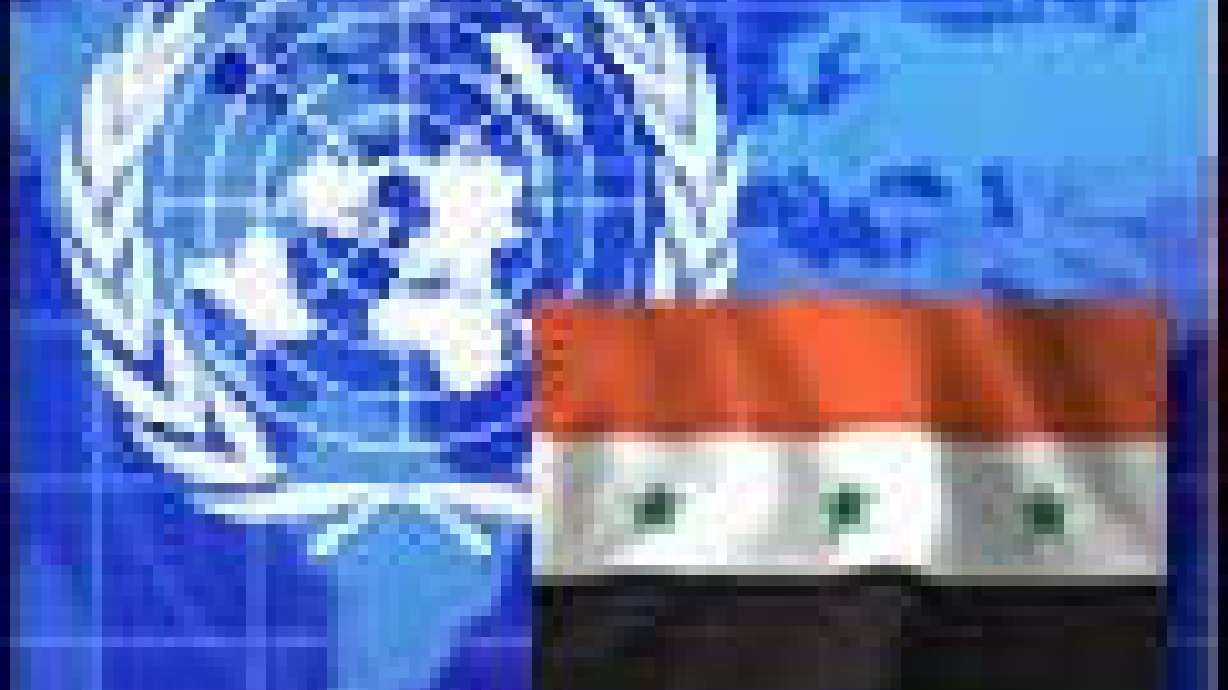Estimated read time: 4-5 minutes
This archived news story is available only for your personal, non-commercial use. Information in the story may be outdated or superseded by additional information. Reading or replaying the story in its archived form does not constitute a republication of the story.
UNITED NATIONS (AP) -- In a surprise move, France on Tuesday proposed immediately suspending U.N. sanctions targeting Iraq civilians, an important step toward the U.S. goal of ending trade embargoes that have crippled the country's economy.
President Bush called last week for sanctions to be lifted quickly, so Iraq's oil revenue can be used to finance reconstruction.
France's U.N. ambassador, Jean-Marc de La Sabliere, made the proposal at a Security Council meeting where members heard a briefing by chief U.N. weapons inspector Hans Blix and for the first time exchanged views on potentially divisive postwar issues.
The Security Council imposed sanctions after Iraq's 1990 invasion of Kuwait. Under council resolutions, sanctions cannot be lifted until U.N. inspectors certify that Iraq's nuclear, chemical and biological weapons have been destroyed along with the long-range missiles to deliver them.
France was in the forefront of opposition to the U.S.-led war against Iraq, along with Russia, Germany and China. But de La Sabliere said before the meeting that Security Council "must take into account the new realities on the ground."
Russian Ambassador Sergey Lavrov had said his country is "not at all opposed to the lifting of sanctions." But he said Russia wants U.N. inspectors to certify that Iraq has been disarmed of all weapons of mass destruction, as required under U.N. resolutions.
He was not immediately available for comment on the French proposal.
The Security Council must wrestle not only with Iraq's disarmament but also the U.N. role in Iraq, control of Iraq's oil revenue and lucrative reconstruction contracts.
At another closed-door council meeting later Tuesday, the council was to hear from Benon Sevan, head of the U.N. oil-for-food program, which had been providing food for 60 percent of Iraq's 24 million people.
France's de La Sabliere said he also proposed that the council phase out the oil-for-food program, which allowed Iraq to sell unlimited quantities of oil provided the money went for humanitarian goods and compensation to victims of the first Gulf War.
Blix stressed the council resolutions that call for U.N. inspectors to have access to all sites and people in Iraq. He said he told the council that he believes the world would like Iraq's disarmament confirmed by an international body that has been involved in the country for over 10 years.
The Bush administration, which accused Blix of hindering its drive for international support for the war, has already sent its own teams to Iraq to search for illegal weapons.
"We see no immediate role for Dr. Blix and his inspection teams," Richard Grenell, spokesman for U.S. Ambassador John Negroponte, said Monday.
In an interview with BBC radio aired Tuesday, Blix said that before the war, the U.S. and Britain appeared to have used "shaky" intelligence, including forged documents, in an effort to prove Iraq had banned weapons.
Blix said it was "very, very disturbing" that U.S. intelligence failed to identify as fakes documents suggesting Iraq tried to buy uranium from the West African nation of Niger. He told reporters at the United Nations on Tuesday that the contract about "yellow cake" uranium "was more than shaky, it was a fake."
He also told the BBC that U.S. officials tried to undermine his inspection team by telling the media that he withheld information about an Iraqi drone from the Security Council.
"They felt that stories about these things would be useful to have and they let it out," he said. "It was not the case. It was a bit unfair and hurt us."
U.N. inspectors went back to Iraq for the first time in four years in late November and discovered no weapons of mass destruction during 31/2 months of searching. Secretary-General Kofi Annan ordered all U.N. international staff, including the inspectors, to leave Iraq just before the war began on March 20. He has said he expects them to return.
Annan also said Tuesday in Austria that Iraqis should be in charge of their own future and natural resources. He acknowledged that "the U.N. is being challenged" but said he expected an agreement on the U.N. role in Iraq in the "not too distant future."
(Copyright 2003 by The Associated Press. All Rights Reserved.)









